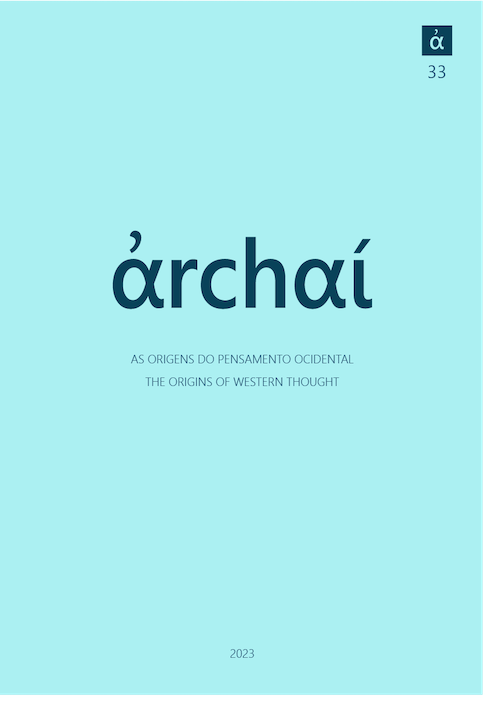The Dialectical Syllogism in Aristotle’s Topics
DOI:
https://doi.org/10.14195/1984-249X_33_30Keywords:
Aristotle’s dialectic, Dialectical syllogism, EndoxaAbstract
The purpose of this paper is an attempt to delimitate what the dialectical syllogism looks like in Aristotle’s Topics. Aristotle never gave an example of a dialectical syllogism, but we have some clues spread over books I and VIII of the Topics which make it possible to understand at least what within a dialectical debate is a dialectical syllogism. The interpretation advanced here distinguishes the logical order of the dialectical argumentation from the order of the debate. This distinction enables us to have a better understand of what is and how the dialectical syllogism is identified in the debate. In addition, we can solve some interpretative difficulties other interpretations could not solve, and have a more solid grasp of how endoxa are used in a dialectical debate.
Downloads
References
ANGIONI, L. (2012). Três tipos de argumento sofístico. Dissertatio, v. 36, p. 187-220.
BARNES, J. (2011). Aristotle and the methods of ethics. In: BONELLI, M. (Ed.). Method and Metaphysics: essays in Ancient Philosophy I Oxford, Oxford University Press, p.174-194.
BOLTON, R. (1999) The epistemological basis of Aristotelian dialectic. In: SIM, M. (Ed.). From puzzles to principles: essays on Aristotle’s dialectic. Lanham, Lexington Books, p. 57-105.
BRUNSCHWIG, J. (1986). Aristotle on Arguments without Winners or Losers. In: Wissenschaftskolleg Jahrbuch 1984/5. Berlin, Siedler Verlag, p. 31-40.
BRUNSCHWIG, J. (2007). Aristote: Topiques, Livres V-VIII Paris, Les Belles Lettres.
KARBOWSKI, J. (2015). Complexity and progression in Aristotle’s treatment of Endoxa in the topics. Ancient Philosophy, v. 35, n. 1, p. 75-96.
MENDONÇA, F. M. (Forthcoming). Os Tópicos e a competência dialética: lógica e linguagem na codificação do debate dialético. Uberlândia, Edufu.
MENDONÇA, F. M. (2023). Vencedores e derrotados no debate dialético de acordo com Aristóteles [Manuscript submitted for publication]. Instituto de Filosofia, Universidade Federal de Uberlândia.
REEVE, C. D. C. (1998). Dialectic and philosophy in Aristotle. In: GENTZLER, J. Method in Ancient Philosophy . Oxford, Oxford University Press , p. 227-252.
SMITH, R. (1993). Aristotle on the Uses of Dialectic. Synthese, v. 96, n. 3, p. 335-358.
SMITH, R. (1997). Aristotle’s Topics: Books I and VIII with excerpts from related texts. Oxford, Clarendon Press.
SMITH, R. (1999). Dialectic and Method in Aristotle. In: SIM, M. (Ed.). From puzzles to principles: essays on Aristotle’s dialectic. Lanham, Lexington Books , p. 39-55.
STRIKER, G. (2009). Aristotle’s Prior Analytics book I: Translated with an introduction and commentary. Oxford, Oxford University Press.
Downloads
Published
How to Cite
Issue
Section
License
Copyright (c) 2023 Fernando Martins Mendonça

This work is licensed under a Creative Commons Attribution 4.0 International License.
Given the public access policy of the journal, the use of the published texts is free, with the obligation of recognizing the original authorship and the first publication in this journal. The authors of the published contributions are entirely and exclusively responsible for their contents.
1. The authors authorize the publication of the article in this journal.
2. The authors guarantee that the contribution is original, and take full responsibility for its content in case of impugnation by third parties.
3. The authors guarantee that the contribution is not under evaluation in another journal.
4. The authors keep the copyright and convey to the journal the right of first publication, the work being licensed under a Creative Commons Attribution License-BY.
5. The authors are allowed and stimulated to publicize and distribute their work on-line after the publication in the journal.
6. The authors of the approved works authorize the journal to distribute their content, after publication, for reproduction in content indexes, virtual libraries and similars.
7. The editors reserve the right to make adjustments to the text and to adequate the article to the editorial rules of the journal.



